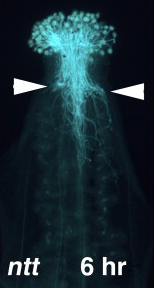Paper of the month (August 2007)
 . .
The NTT Gene Is Required for Transmitting-Tract Development in Carpels of Arabidopsis thaliana
Brian C.W. Crawford, Gary Ditta and Martin F. Yanofsky
Section of Cell and Developmental Biology, University of California, San Diego, La Jolla, California 92093.
Current Biology , Vol. 17, 1101-1108, July 2007
Summary
Background
The majority of pollen-tube growth in Arabidopsis occurs in specialized tissue called the transmitting tract. Little is currently known about how the transmitting tract functions because of a lack of mutants affecting its development. We have identified such a mutant and we used it to investigate aspects of pollen-tube growth.
Results
Reverse genetics was used to identify mutations in a gene, NO TRANSMITTING TRACT (NTT), encoding a C2H2/C2HC zinc finger transcription factor specifically expressed in the transmitting tract. The ntt mutants have a negative effect on transmitting-tract development. Stage-specific analysis of transmitting-tract development was carried out and was correlated with investigations of pollen-tube behavior. In ntt mutants, pollen tubes grow more slowly and/or terminate prematurely, and lateral divergence is accentuated over apical-to-basal movement. Normal transmitting-tract development is shown to involve a process of programmed cell death (PCD) that is facilitated by, but does not depend upon, pollination.
Conclusions
This is the first report of a gene that is specifically required for transmitting-tract development in Arabidopsis. Mutations in NTT cause reduced fertility by severely inhibiting pollen-tube movement. The data support the idea that the function of the transmitting tract is to increase fertilization efficiency, particularly in the lower half of the ovary. This occurs by facilitating pollen-tube growth through differentiation and then death of transmitting-tract cells.
-----------------------------------------------------------------------------
Click here for previously featured paper of the month.
|